Community

Pope Francis on Sept. 2 told his followers to clamber down from their lofty skyscrapers, reclaim public spaces, and rejoin communities.
Speaking at his weekly public audience at the Vatican, the pope said it was up to families to rejuvenate cities.
There may be a lot of ways to spend one’s free time in a city, but love is missing, Francis said.
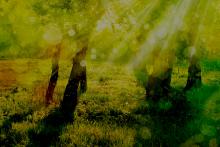
Teens across the world are still flocking to monks in France to deepen their Christian faith? Yes — and my family and I remained in awe of its tent-dotted fields and large scale kitchens staffed all by volunteers.
The Taize community of brothers from across Christian traditions — alongside sisters from a Catholic order — host religious thinkers, leaders, practitioners, and especially youth who want to engage biblically around issues spanning peace, justice, the arts, service, and Christian practice. We came to Taize as a spiritual "vacation-pilgrimage" during their 75th anniversary celebration and the 10th anniversary of Taize's founder’s death, joining religious leaders from around the world.
For American Christians who may be stuck in habits of religious thinking that promote "all or nothing," "left and right" interpretations of the Scriptures, Taize invites us to sing together and investigate the scriptures from a fresh global perspective.

EVEN AS SOUTHERN states—and GOP candidates—jumped through hoops to distance themselves from the Confederate flag, a backlash erupted among those claiming the flag was merely a symbol of “heritage.” Battle-flag waving Southerners (and Confederacy sympathizers) seemed to leap at the opportunity to wave their banner high.
But what about the rest of us? One of the most profound statements I’ve heard recently came from Rev. Jin Kim, founding pastor of Church of All Nations in Minnesota. This Korean-born pastor stood at the podium of the Sojourners Summit and said with conviction: “I am a white supremacist.”
How can this man, a person of color who’s dedicated his life to ethnic and cultural reconciliation, be a white supremacist? The same way any of us can. After all, at its heart white supremacy is not about white hoods, battle flags, and burning crosses. Those symbols are what we call explicit bias. People know when they are practicing it.
But most often white supremacy is about implicit bias that favors whiteness. It’s about the unconscious associations we make in our minds before we even know we’ve done it. White? Rich. Black? Poor. White? Good. Black? Bad. White? Trustworthy. Black? Scary. You get the idea.
These are the unconscious biases that shape the way we order our lives; the communities we live in, the places we shop, the churches we attend, the leadership from others we accept (or reject), and the policies we support (or don’t).
It’s not hard to fume at the thought of the killer of Mother Emanuel’s Nine. And it feels good to click “like” and share posts calling for the removal of Confederate flags.
But if we stop there, bias beats us. It is the unconscious biases of the masses that keep us from moving forward, not the explicit biases of the few. So, check out this tongue-in-cheek list of four easy ways to be a white supremacist (regardless of your own race).
1. Plan a conference on church planting with a speaker lineup so white it would make Honey Boo Boo blush. And if you want to increase your “diversity,” have one speaker of color (even if he is from India), an Asian emcee, and maybe a black worship leader.

AN IRAQ WAR VETERAN passes the offering plate after listening to a sermon on Christian persecution in the early church—tales of torture and execution. A 19-year-old student—home for the summer from college, where her first experience at a fraternity party turned violent—listens to her childhood pastor recite the story of David and Bathsheba and David’s subsequent path to redemption. A mother placates her two children with Cheerios and raisins as she struggles through the exhortations to spousal submission, hiding bruised arms under long sleeves in the middle of July.
The Christian story is littered with trauma—from slavery (the Israelites in Egypt) to sexual assault and abuse (Dinah, Tamar, Bathsheba) to the trauma of war (see: much of the Old Testament) to, of course, the crucifixion of Jesus and martyrdom of his disciples.
There is possibly no better resource for understanding the implications of and need for healing from trauma than faith communities pointing to the cross and Jesus’ answer to violence. Both the need and the opportunity are great. But perhaps too often Christians proclaim the message of Easter—victory and restoration—while skipping past the violence and trauma of Good Friday. Some theologies explain away that violence as a necessary component of ultimate salvation—but let’s get to the salvation part, okay?—leaving survivors of trauma who fill our Sunday pews without a touchstone for healing within the very communities that purport to be safe spaces.

The universe is made up of 96 percent dark matter and energy, swirling with complexity — black holes, empty spaces, bad dreams, failed marriages, unknown territory, broken bowls and bruised shins and loneliness. And yet — look! — everything is still churning along. And in a way that can only be explained in the gut, these alarming dark things are perhaps the only things that have the tendency of bringing people together into community.
As Jean Vanier, founder of L’Arche writes, “In community life we discover our own deepest wound and learn to accept it. So our rebirth can begin. It is from this very wound that we are born.”

I did not celebrate Independence Day this past weekend.
The truth is the United States has never been an independent nation. Built on stolen land by stolen labor, sacrificing Natives and Africans and their descendants to the mythology of “manifest destiny,” greed, oppression, and white supremacy, this has never been a nation of liberty and justice for all.
The ignoble myth of white supremacy that permeates the foundation of this country and underlies the policies and institutions that form the context of our lives has been rearing its ugly head so much lately that it cannot be as easily ignored or denied as it has been in the past. The recent massacre in Charleston and the burning of African-American churches add even more reasons to the hundreds of thousands to awaken to the reality of racism that undermines best ideals of this nation. Our country has failed to atone for, or even critically examine, its history of racial oppression.
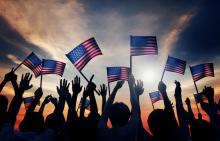
Let’s talk about we.
You know: The first word in the constitution. The one that puts everything that follows it inside a framework of a collective effort and combined responsibility. "We the people." All of us. Together. Part of something bigger than any one of us individually. Yeah, that word.
Have you noticed that we don’t discuss that idea very much? I wonder why. A lot of Fourth of July posts this year went on lavishly about individual rights and personal freedom. And yes, those are important. But they’re only part of the equation, and they’re not even the starting point. It starts not with me, but with we — a pronoun that is radical and revolutionary.

IT’S THE 50TH anniversary of The Sound of Music. I never thought I’d write about it here, but someone recently offered me the kind of gentle admonishment that Maria might have given to the von Trapp children. Maria is usually right, and my friend is too. One of the wisest film critics I know, a man dedicated to contemplation and activism and who doesn’t shy away from the more challenging edges of cinema, still considers it his favorite film.

ONE OF MY favorite descriptions for the people of God, what the New Testament calls the “body of Christ,” is the evocative language of “the beloved community” used by Martin Luther King Jr. during the civil rights movement.
A beloved community is a powerful vision of a new coming together, a new community that welcomes all peoples in their diverse ethnicities and nationalities. Everygroup, clan, and tribe is included and invited in. That dream and vision undergirded King’s movement for civil and voting rights, both spiritually and philosophically, and deeply reflected his own underlying moral belief and hope as a Christian minister.
Yet in one of his most famous quotations, King also said this: “I am ashamed and appalled at the fact that 11 o’clock on Sunday morning is the most segregated hour in Christian America.” He said this in 1953, while he was still associate pastor at his father’s Ebenezer Baptist Church in Atlanta. But obviously, and most painfully, that quote is still true today.
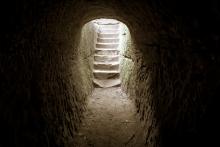
I’ve celebrated Easter before. My whole life I’ve dressed up, colored eggs, gone to church.
But this year was different. This year, I realized resurrection.
I’m not sure how the realization came.
Maybe it came because this was the first time I gardened. My mother once said, “Gardening is prayer.” I never believed her until I physically saw the transformation of dead earth into mustard greens and zucchini plants. I never realized how good the pulse of the sun felt on my back after months of gray. I never saw seeds push through the darkness of soil and become new life — until this year, when I realized resurrection.
Maybe it came because this was the first time I’ve ever felt depression. This winter was the first time there were no windows in the tomb. The first time I held myself crying in the shower wondering if the emptiness would stop. This year was the first time I saw Lent as a season to sit in deep sadness. The first time I realized that Mary Magdalene sat at the tomb simply because she was just so sad.
Maybe it came because this was the first time I’ve fully embraced a Christian community. The first time I’ve intimately walked through the liturgical season with the same people. The first time I shared the miracle of Christmas and the deep sadness of Lent in the eyes of other vulnerable humans. The first time I’ve attended an entire week of Holy Week services. The first time I sat in the dark on Good Friday after service ended and cried.
This year, I realized resurrection and I’m not exactly sure why.

Going it Alone
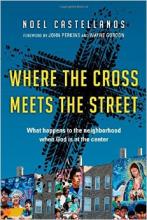
NOEL CASTELLANOS is the CEO of the Christian Community Development Association, a network of Christians committed to seeing people and communities restored spiritually, economically, physically, and mentally. In order to nurture that holistic work, committed CCDA practitioners move into under-resourced neighborhoods and try to foster community. Castellanos’ experience with CCDA and a lifetime of missional community has informed his new book, Where the Cross Meets the Street: What Happens to the Neighborhood When God Is at the Center (IVP Books), a powerful testament to the necessity of externally focused ministry. He was interviewed via email by Dave Baker, who is responsible for school accounts and diversity initiatives at Baker Book House.
Dave Baker: You write that in terms of diversity, the evangelical community is far behind the rest of society. In what ways?
Noel Castellanos: Most evangelical denominations and organizations are not very ethnically or culturally diverse in leadership. With the amazing demographic changes that are happening in our country, how can we possibly be in a position to effectively reach and disciple people of color if the leadership on boards and in executive positions is all white?

So it’s almost Valentine’s Day. Seemingly everywhere you look is a celebration of love and romance. There’s so much sweetness in the air (and on store shelves), it has almost the opposite effect.
Especially if you’re single. Valentine’s Day is often one of the most uncomfortable days of the year. It’s that one special day a year in which single people are painfully reminded that we may very well die alone and childless. Unfortunately, in our romance and sex-saturated culture, every day kind of reminds you of that.
The church hasn’t offered much by way of alternatives. In the evangelical church, there’s far too much “Jesus is my boyfriend” or “I’m dating Jesus”-type songs and teaching that it trivializes the kind of intimacy that can exist between God and humanity. And it silences the deeper pain of loneliness and disappointment that single adults — both gay and straight — can feel. Humans were made for relationship with God, but we were also made for relationships with each other.
There are a couple of issues at work here. On one hand, we’re fed so much junk about sex and romance and relationships from our culture that it becomes difficult to think any differently about love. When the highest, most celebrated form of love in our culture is erotic love and romance, the concept of spiritual intimacy with God seems unsatisfying and — let’s be real — also kind of icky. It feels like a consolation prize, something you say to make yourself feel better about being alone.
On the other hand, in the church, marriage almost becomes an idol. Christina Cleveland writes all kinds of amazing things about singleness in this essay, (so many I want to quote!) but this stands out:
“After interacting with the church, many singles start to wonder: Is there something wrong with me? Is God working in my life? Am I as valuable (to God, to the church) as married people? Does God love me as much as he loves married people? Does God have good things in store for me as a single person?”
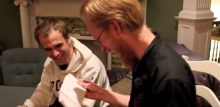
It’s rare that a film can take all of these journeys and still tell a cohesive story. Sometimes, when we’re very lucky, a truly special film comes along that gets as close as possible to combining and distilling the infinite layers of the human experience. The Sojourners Internship Program is one of these truly special feats. It takes each facet of its characters’ journeys seriously, and allows each of them to explore those facets in their own unique ways.
Like most great stories, the setup of The Sojourners Internship Program is simple, but filled with the potential to go any number of directions: 10 individuals from different ethnic, economic, political and spiritual backgrounds are selected as interns for a social justice organization. They travel to Washington, D.C., to live in community and work together. But the community they live in is no ordinary community, and neither is the organization. The interns enter their house in Columbia Heights as strangers with hopes, ideals, doubts and a few preconceived notions. But they will leave forever changed.

I’ve always cringed when I hear someone say, “Love the sinner but hate the sin.”
In the end, I don’t quite know how to do that. I get the sentiment, and I think it basically comes from a well-intentioned place. Essentially, when someone says this, I think they’re trying to be kind and caring for the person above and beyond any kind of vice or sinful deeds that person has committed. You know: Man, I really love Steve but I hate his alcohol addiction. Deborah is a wonderful friend but her tendency to gossip is really not so wonderful. James has a heart of gold but I just can’t condone his adultery.
We love and affirm people but we don’t affirm the things they do that hurt themselves, others, or are an affront to God’s dream for them and their God-given potential.
But sin is not just the things we do (or do not do — there are both sins of commission and omission). Sin is something we can’t quite shake. While we’re first created good, as Desmond Tutu has reminded us, we certainly fall short (always be sure to remember Genesis 1:31 as the first word and Genesis 3 as the second).
Sin is a reality of our brokenness this side of Jesus’s return and that fully realized realm of God where there will be shalom and no one will hunger or cry anymore. Sin isn’t the way it’s supposed to be. So many want to make it out to be a laundry list of "don’ts" along life’s way — our faith, in the end, teaches us that it’s so much more than that.
I reject the whole notion of love the sinner but hate the sin — it misses the Gospel point that we are more than our inadequacies or things that we’ve done or not done that have missed the mark. We are better than our sin — we are created in the beautiful image of God.

IN THE U.S., mention of “aging in community” might conjure up images of weathered faces in nursing homes and snowbirds in South Florida. And yet, as increasing numbers of Americans reach the golden years—and do so in an uncertain economy—so do the array of scenarios for those growing older. Award-winning journalist Beth Baker traveled across the U.S. to document the possibilities in her latest book, With a Little Help from Our Friends: Creating Community as We Grow Older.
Some of her findings aren’t so surprising. Baby boomers have a stronger desire for independence than did their predecessors, and they aren’t keen on being tagged “elderly.” In fact, they generally see themselves in a different cohort than those born just prior to the boom.
Whether you’re in one of the aforementioned age groups or a diligent millennial thinking way ahead, Baker shows that imagining how you’ll one day balance independence with human connection in your older years doesn’t have to be daunting.
“That we can raise this question is remarkable. Never before have older people, often through their own imagination and determination, had real options from which to choose,” she writes.

Just over fifty-three years ago, a huge wall was built, a mighty fortress – a wall around East Berlin, a wall to keep out and a wall to keep in. This wall isolated people and forcefully molded them into a single, straight, dreary one-dimensional way of living. The wall represented an oppressive system without cracks, without breaks, without life.
Almost 500 years ago, a monk by the name of Martin Luther felt the pressures of another oppressive system, one in which a person was never sure of God or God’s mercy, one in which a person could even pay to climb the stairway to heaven quicker and easier. In many aspects, the church itself had become a fortress, dictating who was in and who was out.
Every system, every culture, every community risks succumbing to the temptation of shutting borders and protecting an identity. We are quickly seduced into the illusion of absolute control and power. Brick by brick, wall by wall, suspicion by suspicion, power is built, oppression takes hold. We construct an identity, a security, a world. We construct our own way to heaven. (Or is it to a ghetto?)
Who or what can defeat and break the walls, the towers, the fortresses we construct? Who or what can overcome oppression in the land? Where do we turn when creation shakes and societies are in an uproar?
THE CRY OF the church to the world should be “Forgive us.”
At a time when the American church struggles with finding its place in the world and struggles with asserting its identity, could the church be known as the community that models confession, repentance, and the seeking of forgiveness? At this moment in history, the American church is often ridiculed or portrayed as unforgiving and ungracious. Could the church offer a counter-narrative, not of defensiveness or derision but of an authentic confession and genuine reconciliation? By examining seven different areas where the church has committed sin, we ask the church to consider the spiritual power and the theological integrity of a church that seeks forgiveness for those sins.
Our scriptures testify to the necessity of confession. Confession is central to the Christian faith. The importance of confession arises from the Christian view of sin. Sin is a reality and must be taken seriously. Evangelicals consistently begin our gospel presentation with the centrality of sin to the human experience. American evangelicals often assert that the beginning of the work of God’s forgiveness is the recognition of our need for God because of human sinfulness.
It is antithetical to the gospel when we do not confess all forms of sin—both individual and corporate. The reason evangelicals can claim to be followers of Jesus is because there has been an acknowledgement of sin and the seeking of God’s grace through Jesus Christ that leads to the forgiveness of sin.

For one year, my wife and I are living 2,700 miles apart.
She lives in a one-bedroom apartment here, south of San Francisco. Each weekday she walks two blocks to the home of our middle son and his wife, where she cares for their 9-month-old son.
“Granny nanny” is what they call this phenomenon. Once maternity and paternity leaves expire, grandparents across the country are moving close to their adult children, maybe into their homes, to provide child care so both parents can pursue their careers.
A six-hour plane ride away, I am back in our Manhattan apartment, where our youngest son, age 23, is living at home until he lands a job in the worst job-finding environment since the Great Depression.
Our oldest son, meanwhile, is adapting his country house to become a multigenerational household next year, when my wife returns east. I have already had a taste of caring for their 8-month-old daughter, and it is wonderful.
It seems we have joined a growing trend toward sharing living space: three generations (grandparents, parents and children) or two generations (parents and adult children).